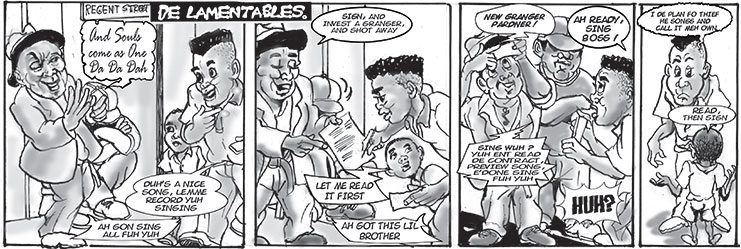IMAGINE you acquired big money-new money through some illegal method-and your social status protected you so far, or your money is legal,now you want to invest, to make stress less money and to socially look good as a legitimate businessman with all the conspicuous trappings.
You open a TV and radio station and a movie and music sales and rental with the latest and the top shows and music. You are assured that you can always download music and movies, your only business expense is the right software and CD/DVD burners, a printer and cheap CDs and DVDs. With the local talent, you buy one CD and burn 500 for your store and play the music on your radio without worry. Who cares and what can they do? Everybody is doing it,so?
Suddenly Guyana joins the rest of the world and is proposing a Bill on copyright legislation. You’re angry. You’re not sure what this means. You’ve never paid that much attention to the business anyway, so you don’t know what your options are much less how your readymade media syndicate business could be managed legally. The fact is you have got to now pay attention.

One of the first things with copyright legislation is that the rewards for violations in the courts will have to correspond to CARICOM ceilings, which could mean that the sum will be attractive enough that a financially-strapped businessman in the US will be enticed to pay eager notice to his trademark. You have to on your downtown business. Lawyers here are going to verify that you have the money in the bank and who owns the real estate, then take you to court, whether you withdraw the cash from your account. They will then come for the real estate on value. The same applies to the creative person locally, who equipped with his copyright certificate will feel justified to take an offender to the courts.
Copyright laws are not to be feared, as long as it’s managed locally by people who understand what needs to be done to prepare procedures to both enforce and empower. There’s no doubt that there must be time periods of consideration, of leniency based on the acute economic factor that businesses, especially in the music and movie retail areas, were paying taxes while selling pirate goods, thus, state-endorsed piracy, because any other effort would have meant going out of business.
The path to copyright legislation is inevitable if businesses within the cultural industries framework are to be allowed to exist,and new economic blocks have to be developed, if Guyana is to expand its expertise – oil or no oil. Software restrictions already exist, as there are limitations to how much one can exploit software that is illegitimate in the search for tutorials that require certification. Like every other economic block, for the impact of copyright to integrate as an economic tool, the government’s participation must be involved outside of the customary political norms.
Copyright will require a legal and practical economic bureau that will be able to explore, awake and re-educate the ‘Rip Van Winkle’ bureaucratic customs that will pose a hindrance to the local research and development applications, relevant to guiding the awareness and relationship of the ‘Human Right’ of copyright. In the initial stage it might be necessary to engage a recommended source, versed and connected to entities in the first world that would be necessary to be in collaboration. For the process, re-empowering must be phased out in economic practices in the normalising towards copyright.
Again, who do copyright benefits involve and include? To be direct I must itemise a short list; architects, engineers, playwrights, furniture designers, creative persons in the design of industrial and domestic tools, equipment and items, artists, designers, writers, musicians, jewellery designers, fashion/clothing and accessory designers, poets, culinary formulas, lawyers, and anyone with a workable original idea, and of course,the above and their families and the merchants who sell whatever is produced- in fact – all of us.
Copyright is intended to allow and encourage the soul that the muse whispers to, to create and add something to our senses and to be allowed to have that creation protected.
I have a friend who is in the craft business. Every piece of work that he labours to bring into existence is quickly reproduced by other craft sellers. The same goes for a jeweller friend who has abandoned his trade because of bad reproductions of every original piece he has produced. He now builds desks and benches up to the last time we spoke. The persons who steal copyrighted material want to benefit 100 per cent.
I explained to a photocopy shop official that many of the items that he was violating could be licensed to his entity for production, if he were to embrace that direction. I saw him sometime later and he told me that his boss didn’t want to do anything like that, since it would have a cost factor attached to it. In closing, recently at the lecture by Dr. Abiola Inniss at the National Library on Thursday, October 25, a young officer attached to the GPF band gave a display of legal logic: “If you create a chair and someone stole it, isn’t it a criminal offence, so what’s the difference with copyright that involves a created work like a song? I too agree copyright charges should not be civil matters. These offences should now and always be criminal offences.”



.jpg)








